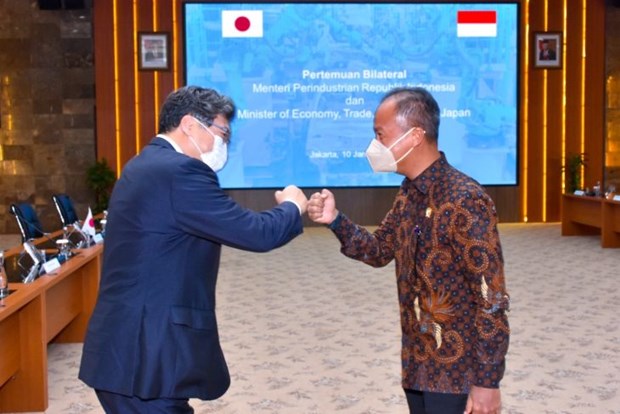Indonesia, Japan intensify cooperation in automotive, digital technology industries
Indonesia and Japan seek to intensify comprehensive economic cooperation, especially in the automotive and digital technology sectors.
 Indonesian Minister of Industry Agus Gumiwang Kartasasmita (right) held a meeting with Japan's Minister of Economy, Trade and Industry (METI), Kōichi Hagiuda (left)
Indonesian Minister of Industry Agus Gumiwang Kartasasmita (right) held a meeting with Japan's Minister of Economy, Trade and Industry (METI), Kōichi Hagiuda (left)
The synergy was strengthened through a meeting between Indonesian Minister of Industry Agus Gumiwang Kartasasmita and Japanese Minister of Economy, Trade and Industry (METI) Kichi Hagiuda on January 10, Indonesia's Antara news agency reported.
Agus drew attention to several economic cooperation agreements between Indonesia and Japan, including the Indonesia-Japan Economic Partnership Agreement (IJEPA), which was currently in the stage of general review negotiations.
There is also cooperation with the New Manufacturing Industry Development Center (MIDEC), he remarked.
In addition, Agus noted that the Japanese government had proposed economic cooperation in Asian countries called the Asian Japan Investing for the Future Initiative (AJIF).
Currently, Japan is promoting the AJIF proposal to ASEAN member countries for support, he said.
The areas of cooperation proposed by Japan include supply chain diversification, introducing the development and utilisation of renewable energy technology and energy management systems, as well as cooperation in feasibility studies for quality infrastructure.
Japan also seeks to forge cooperation in the application of digital technology in all levels of society and the development of quality human resources, with the capacity to utilize digital technology. Indonesia also proposed cooperation in implementing industry 4.0 with Japan through the New MIDEC programme.
Japan is also keen to further bolster cooperation in the automotive industry. This technical cooperation project will involve various partner institutions in Japan, such as cooperation with JICA and METI.
The automotive industry is one of the most important sectors and a major contributor to the GDP. Currently, 21 industrial companies of four-wheeled or more vehicles have a production capacity of 2.35 million units per year by absorbing 38,000 direct workers.
The total invested investment reaches 140 trillion Rp and provides a source of livelihood for 1.5 million people working along the industry value chain./.
VNA

